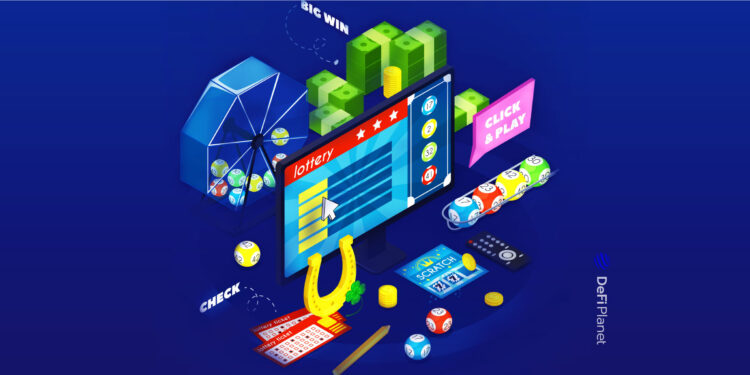The rise of the decentralized web often referred to as Web3, has made a big impact on different industries and how we use digital services. Web3 aims to give individuals more control by creating decentralized platforms that remove the need for middlemen and boost user trust.
One industry that can benefit from Web3 is the gambling sector, which has over the years grappled with issues such as lack of transparency and regulatory challenges.
Decentralized betting is an exciting new concept gaining popularity among online gambling fans. It uses blockchain technology to create betting systems that let people securely and transparently place bets on events and outcomes. This approach can effectively solve many of the problems linked to traditional online betting.
In this article, we’ll explore what Web3 betting is, how it works, its pros and cons, and introduce you to some of the top Web3 betting platforms.
What is Web3 Betting?
Web3 betting is a form of online betting that operates on smart contracts and decentralized applications (dApps) built on blockchain networks like Ethereum.
In traditional betting, a central organization manages bets and payouts, leading to issues like a lack of transparency and a higher risk of fraud.
In Web3 betting, the process is automated through smart contracts, removing the need for wager books and intermediaries. Smart contracts are self-executing programs that execute bet terms when the outcome is determined, ensuring secure and transparent bets and payouts.
This system is transparent, safe, and free from fraud because all bets and transactions are recorded on a public blockchain for everyone to see. Users can participate by using cryptocurrencies like Ether (ETH) or stablecoins.
How Does Decentralized Betting Work?
Decentralized betting involves using a digital wallet to make bets with digital currencies. Here’s how it works:
- Digital Wallet: To participate, users need a digital wallet. This wallet allows them to hold and use digital currencies.
- Placing Bets: Once users link their digital wallet to the betting platform, they can add the digital currencies they want to use for their bet.
- Recording Bets: Users’ bets are securely recorded on the blockchain. This includes all the essential details like the bet amount, odds, and the event they are betting on. This information is stored in a smart contract dedicated to that specific bet.
- Smart Contracts: These smart contracts also keep track of the digital wallets of the users involved in the bet.
- Outcome Determination: When the outcome of the event is known, the smart contract automatically enforces the bet’s conditions. For example, if two users placed a bet, the winnings are automatically transferred to the digital wallet of the winner. The loser, on the other hand, receives nothing, as agreed upon in the smart contract.
This decentralized system ensures transparency and eliminates the need for intermediaries in online betting transactions.
Decentralized Betting vs. Traditional Betting
Decentralized Web3 betting has numerous advantages over traditional betting:
Transparency and Immutability
Web3 betting platforms ensure transparency by recording all transactions on a public ledger. This makes it impossible for users, bookies, or leagues to manipulate outcomes.
Low Transaction Costs
Decentralized betting cuts costs by removing middlemen like banks and payment processors. Users can deposit and withdraw funds without any extra fees.
Enhanced User Security and Privacy
Personal information is safer in decentralized systems, as it’s not controlled by a central authority. Additionally, the decentralized nature means that there isn’t a single point of failure, making it harder for hackers to compromise the system.
Improved Trust and Reduced Fraud
Blockchain technology guarantees that betting results remain unaltered. This promotes trust in the industry and reduces the risk of fraud.

BetDEX Labs Inc. is a Web3 company building open-source technology for global prediction markets. The BetDEX Exchange is a sports betting exchange built on the Monaco Protocol, allowing for peer-to-peer wagering.
This innovative approach to online betting makes BetDEX Exchange an attractive option for users looking for a more secure and cost-effective platform for their betting needs.
The exchange is licensed and regulated under the jurisdiction of the Isle of Man via the Gambling Supervision Commission. BetDEX is a key contributor to the Monaco Protocol, a permissionless decentralized and open-sourced protocol built on the Solana blockchain, supporting prediction and betting markets.
Since its introduction in November 2022, BetDEX has continuously improved and expanded its exchange, adding a wide range of markets for different leagues, including the Bundesliga, Serie A, NFL, NBA, and NCAA Basketball. The English Premier League and FIFA World Cup markets were also available at launch.
Dexsport

Dexsport is a decentralized Web3 betting platform that lets you enjoy online betting on the go. It offers sports betting, market prediction, P2P betting, and NFT art collection. Dexsport ensures transparency using shared liquidity pools and smart contracts to pay out winnings. In 2021, they introduced their native token, $DESU, which helps ensure accurate betting odds and transparent mathematical models.
Aver

Aver exchange is a Solana-based decentralized protocol that allows participants to trade with one another by matching opposing bets (i.e., peer-to-peer). Unlike traditional bookies, no “house” is involved, meaning no middlemen and counterparty risk. Aver has also become open-source, letting third parties build applications on top of it.
Polymarket

Polymarket is a blockchain-based betting platform that allows users to place bets on current and future events in politics, sports, and more using the Ethereum blockchain. All outcomes are tokenized and exchanged securely through the Polygon network. Polymarket uses the USDC stablecoin, tied to the US dollar, making it accessible to people worldwide.
Is Decentralized Gambling Legal?
The rules surrounding decentralized gambling, like online gambling, vary across different countries and can be quite complex. In some countries, online gambling may be partially allowed, while in others, it’s completely banned.
For instance, certain countries allow decentralized gambling, but only through licensed and regulated operators. On the flip side, other nations may restrict specific types of gambling or require providers to obtain licenses.
While most governments can’t prevent you from using cryptocurrencies for gambling because they operate on decentralized networks, it’s essential to check your local laws and regulations before you start. This way, you can ensure you’re not breaking any rules or getting into legal trouble.
Criticisms and Challenges of Web3 Betting
Web3 betting, which leverages blockchain technology and cryptocurrencies, has its fair share of criticisms and challenges. Some of the notable concerns include:
- Regulatory Uncertainty: The decentralized nature of Web3 betting can create regulatory challenges. Many governments are still figuring out how to regulate this emerging sector, leading to uncertainty for both operators and players.
- Security Risks: While blockchain technology offers enhanced security, it’s not entirely immune to hacks and vulnerabilities. Smart contracts and wallets can be targeted, potentially leading to the loss of funds.
- Lack of Consumer Protections: Traditional gambling regulations often include consumer protections and responsible gaming measures. The decentralized nature of Web3 betting may make it harder to enforce such safeguards.
- Volatility: Cryptocurrencies, which are commonly used in Web3 betting, can be highly volatile. This means that the value of your bets and winnings can fluctuate significantly.
Future Outlook for Web3 Betting
The future of Web3 betting holds promise and potential. Here are some key aspects to consider:
- Innovation: Web3 betting platforms continue to innovate, offering unique features and games that traditional gambling cannot replicate. This innovation is likely to attract a growing user base.
- Regulatory Clarity: Over time, governments may provide clearer regulations for Web3 betting, helping to establish a more stable and secure environment for both operators and players.
- Mainstream Adoption: As cryptocurrencies become more widely accepted and user-friendly, Web3 betting could see increased adoption among mainstream users.
- Interoperability: Improved interoperability between different blockchain networks could make Web3 betting more accessible and convenient.
If you would like to read more articles like this, visit DeFi Planet and follow us on Twitter, LinkedIn, Facebook, and Instagram, and CoinMarketCap Community.
“Take control of your crypto portfolio with MARKETS PRO, DeFi Planet’s suite of analytics tools.”





















